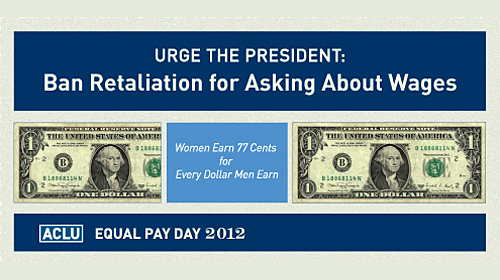
Would you know if the person sitting next to you at work was being paid significantly more than you to do the same job? If you suspected that might be the case, would you know what to do about it? You might start by simply asking the question. Unfortunately, there's a chance that you could be fired for doing just that. of American workers are either forbidden or strongly discouraged from discussing their pay with colleagues. Not just inquiring, but merely discussing โ that means that in plenty of workplaces, you can be fired for just volunteering information about your own salary.
That's right: your conversation at the water cooler could cost you your job.
This brand of punitive pay secrecy has dire implications for women, who even today โ almost 50 years after the passage of the of 1963, still make just 77 cents for every dollar earned by men. For women of color, the : in 2010, African-American women earned only 62 cents and Latinas only 54 cents for each dollar earned by a white man. It's these dismal statistics that force us to reluctantly mark Equal Pay Daythis year on April 17, 2012 โ the point into 2012 that a woman must work, on average, to make she same amount a man did in 2011 alone.
The serious wage gap, combined with pay secrecy policies, means that many women are not only being paid less than their male co-workers, but they have no way of knowing it. And if they don't know it, they can't fight it.
Thankfully, this Equal Pay Day, we can do something to change that.
President Obama has the opportunity to take a huge step towards ensuring pay equality right now by signing an executive order that would protect people who work for federal contractors against retaliation for disclosing or asking about their wages. Federal contractors include any company that receives federal taxpayer dollars to do work for the government. ภฯฐฤรลฟชฝฑฝแน๛ in America work for such contractors โ that's over 20 percent of the entire U.S. workforce. , president after president, of both parties, have used the power of executive orders to protect employees who work in companies that contract with the federal government. These steps have often led the way later for expanded protections for all workers.
Allowing all of these workers to discuss their salaries without fear of losing their jobs will give women an important tool for finding out whether or not they are being treated equally. And that's the first step to fighting back against pay discrimination.
This month, the president has put the issue of women's economic security center stage. Speaking at a on women and the economy, he announced the release of a new by the White House Council on Women & Girls, which details progress the administration has made in initiatives that support women throughout their careers. He also acknowledged the continued pay gap, , "Overall, a woman with a college degree doing the same work as a man will earn hundreds of thousands of dollars less over the course of her career." And in an last week, he emphasized the importance of fixing that, writing
"Closing this pay gap โ ending this pay discrimination โ is about far more than simple fairness, it's about strengthening families, communities and our entire economy."
We couldn't agree more. With acting as the primary breadwinners in their homes, far too many families are taking home far less than they deserve. Women can't wait any longer. That's why it is so crucial that President Obama brings immediate relief to the millions of women employed by federal contractors by issuing an executive order that will protect them from retaliation for discussing their wages.
Of course, federal legislation is still needed to protect all workers against discrimination. The Paycheck Fairness Act, a bill currently pending in both the and , would help close some of the loopholes in the Equal Pay Act of 1963, which have made that law less effective over time. Among a range of other provisions, it would prohibit retaliation against employees who inquires about or discloses wage information โ much like the proposed executive order โ but would extend coverage to all workers (with some limited exceptions), not just those who are employed by federal contractors.
There's no question that the Paycheck Fairness Act is necessary โ but while Congress remains gridlocked, millions of women are still waiting for fair treatment.
You can help to end that wait for millions of women. today by urging President Obama to issue an executive order banning retaliation against federal contract employees for discussing their pay.
Learn more about pay discrimination: Sign up for breaking news alerts, , and .

